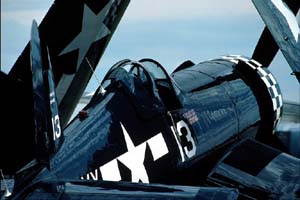Goodyear FG-1D Corsair
U.S. Navy Fighter
 |
The Ghost Squadron's FG-1D Goodyear-built Corsair. Image source: The Confederate Air Force Ghost Squadron CD-ROM produced by Corel. Photos by Bill Crump. |
Designed by Vought, and built by both Goodyear and Brewster during the war, the F4U Corsair is one of the best known U.S. Navy fighters of World War II. In the Pacific, its firepower and speed in the ground attack role earned it the nickname "Whistling Death" by the Japanese, while the U.S. forces often called it the "Sweetheart of Okinawa".
The first production F4U-1 flew on 25 June, 1942, and deliveries began to the U.S. Navy and Marines in October 1942. Due to troubles with the landing gear on early model Corsairs, which caused them to bounce over the arresting wires on Navy carriers, most of these went to Marine air units, which flew from land-based strips.
The 2,000 horsepower of the F4U-1 required a massive propeller over 13 feet in diameter to handle the power, and the now familiar inverted-gull wing of the Corsair provided extra ground clearance for the propeller without overly long and weak landing gear legs.
The first U.S. fighter to exceed 400 miles per hour in level flight, the Corsair was in demand as an interceptor as well as an attack aircraft. Vought built about 4,700 F4U-1s, while production was also contracted to Brewster, who built 735 designated F3A-1, and to Goodyear, who produced over 4,000 as FG-1s, including A and D models.
To increase the Corsair’s offensive punch in the ground attack role, the F4U-1D version added drop points for two 1,000 pound bombs and up to eight 5 inch rockets under the wings. These were in addition to the six .50 caliber machine guns in the wings. Vought built 1,375 F4U-1Ds but most were built by Goodyear as FG-1Ds, who produced over 2,300.
Despite the U.S. Navy’s problems operating the Corsair from carriers, Britain’s Fleet Air Arm was desperate for high-performance carrier fighters and received over 2,000 of the design, which they designated Corsair Marks I through IV. The British Corsairs had their folding wings shortened slightly, to better fit the smaller British carriers. Modifications to the Corsair’s landing gear in mid-1944 resulted in the U.S. Navy accepting the design for carrier operations later that year.
In September 1944, the F4U-4 first flew, and this was the final wartime production version of the Corsair, featuring an uprated engine of 2,100 horsepower. Corsair design and production continued after World War II, ending in December 1952, during the Korean War. Total Corsair production by all sources reached 12,571.
Specifications
One Pilot One Pratt & Whitney R-2800-8W Engine Hamilton Standard 3-bladed Propeller Six .50 caliber Machine Guns Max. Speed 425 mph @ 20,000 feet Initial Climb Rate 3,120 ft/min |
Length 33' 4" Max. Weight 13,120 lbs Normal Fuel 273 gallons Normal Range 1,015 miles |